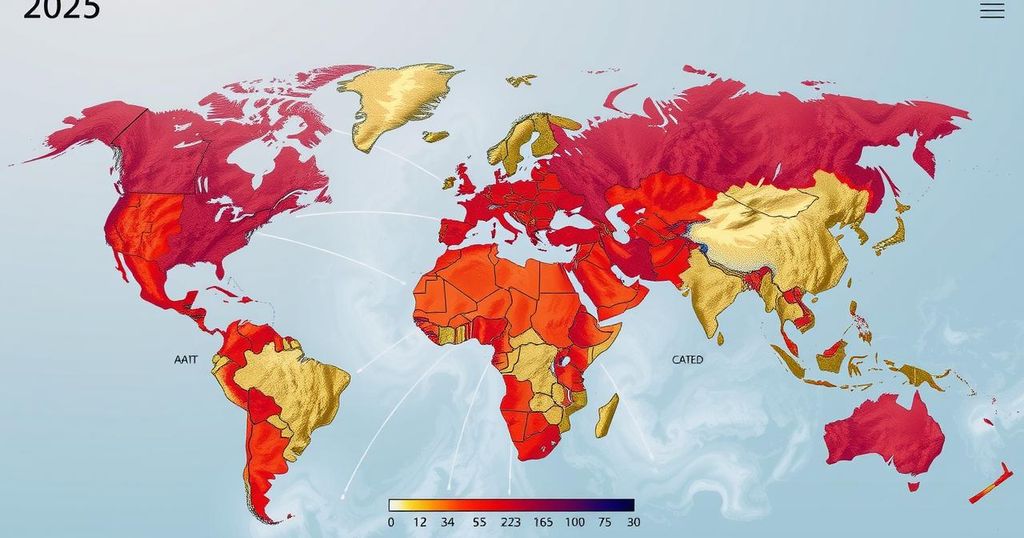2024: A Turning Point for Incumbents in Global Elections, With Challenges Ahead in 2025
In 2024, incumbents faced unprecedented electoral setbacks globally, losing vote shares for the first time in recorded history. Factors contributing to this trend included rampant inflation and decreasing partisan loyalty. Looking ahead to 2025, upcoming elections suggest incumbents may continue to struggle against heightened expectations from voters seeking change, as the political landscape becomes increasingly volatile.
2024 was heralded as a critical year for democracy but ultimately became a turning point for incumbents globally, characterized by unprecedented defeats for governing parties in developed nations. For the first time in recorded history, all incumbents faced significant vote share losses in a single election year, leading to a marked shift in voters’ traditional support. The historical incumbency advantage appears to have diminished as voter sentiment shifted from tolerance to a desire for change, epitomized by Kamala Harris’s struggles related to President Biden’s policies, which favored Donald Trump. Looking towards 2025, it is crucial to analyze the underlying causes of this upheaval.
Historically, incumbents enjoyed considerable advantages in wealthy democracies, where political power generally exchanged hands among established parties after lengthy periods of stability. However, this trend has altered, with increasing volatility now resembling characteristics of elections in less affluent democracies, as noted by Professor Ben Ansell of the University of Oxford. This evolution is distinctly linked to voter discontent, particularly exacerbated by inflation and the economic repercussions following the pandemic and geopolitical tensions.
The rise in inflation significantly impacted voters’ perceptions of governing bodies, with inflation blamed for the electoral downfalls witnessed in 2024. Economic turmoil, driven by supply chain disruptions and increased demand post-Covid-19 lockdowns, manifested as global inflation reaching levels not seen since the 1990s. Although inflation is a worldwide phenomenon, voters tend to hold local governments responsible, culminating in electoral losses. As Professor Isabella Weber highlights, “Inflation hurts everybody less than unemployment, but it’s so widespread; unemployment weakens governments. Inflation kills them.” In contrast, Claudia Sheinbaum’s success in Mexico demonstrated that implementing strict price controls could mitigate inflationary impacts.
Nevertheless, economic concerns are not the sole force behind incumbents’ diminishing fortunes; cultural and structural changes also play a pivotal role. There is a pronounced trend towards declining partisan loyalty among voters, resulting in increased vote-switching and the ascent of novel political entities. According to Roberto Foa from the Centre for the Future of Democracy at the University of Cambridge, this lack of allegiance encumbers traditional parties. Additionally, voters, akin to consumers, express heightened expectations, which embolden emerging parties unwilling to conform to established political norms.
An examination of forthcoming elections in 2025 reveals that incumbents may continue to face significant challenges. The German Chancellor Olaf Scholz is poised for potential ousting after losing a confidence vote, with similar sentiments echoed in Canada surrounding Prime Minister Justin Trudeau’s leadership. In Australia, strong opposition looms against Anthony Albanese’s tenure. Furthermore, the political landscape in Moldova faces external influence threats, undermining stability. While some emerging democracies in Latin America display resilience, the overall trend points towards continued volatility for incumbents.
In conclusion, the fate of incumbents in democratic systems remains uncertain as they grapple with an environment shaped by rampant inflation, shifting voter expectations, and evolving political allegiances. If electorates remain dissatisfied with their leadership, they will likely express this through the ballot box. However, the potential for a continuous cycle of electoral punishment, without corresponding rewards, may impede the restoration of trust and stability in governance.
The article discusses the significant electoral defeats experienced by incumbents in 2024 across developed democracies, emphasizing a global shift in voter sentiment towards political instability and volatility. It highlights the effects of inflation on electoral outcomes while noting the declining partisan loyalty among voters. The narratives surrounding political changes are enriched by historical context, examining the evolution of incumbency advantage and its implications for future elections. Insight from experts provides a comprehensive understanding of contemporary voter behaviors and expectations.
Overall, the challenges faced by incumbents in 2024 offer critical insights into the changing nature of democracy. As inflation and cultural trends continue to destabilize traditional politics, voters increasingly demand change and responsiveness from their elected officials. The future of democratic governance may hinge on the ability of incumbents to adapt to these evolving expectations, while simultaneously ensuring that the political process remains fair and rewarding for both leaders and constituents.
Original Source: www.cnn.com




Post Comment